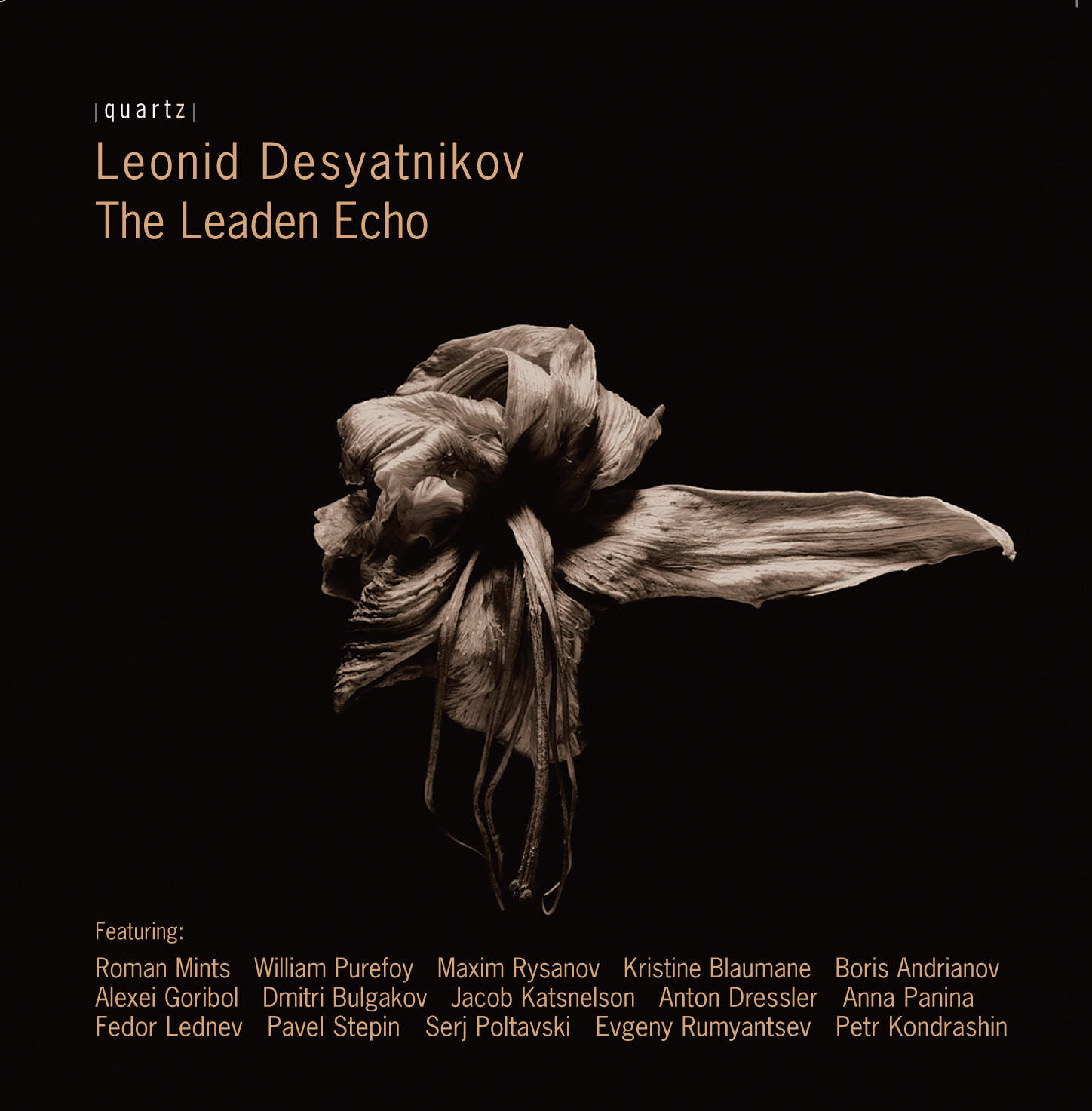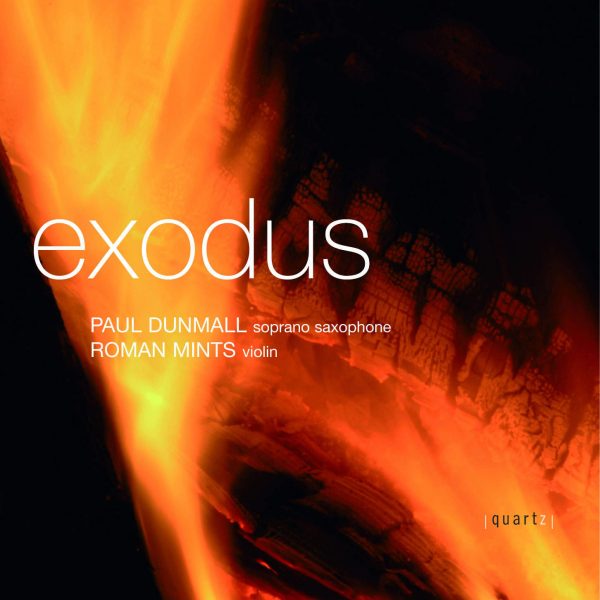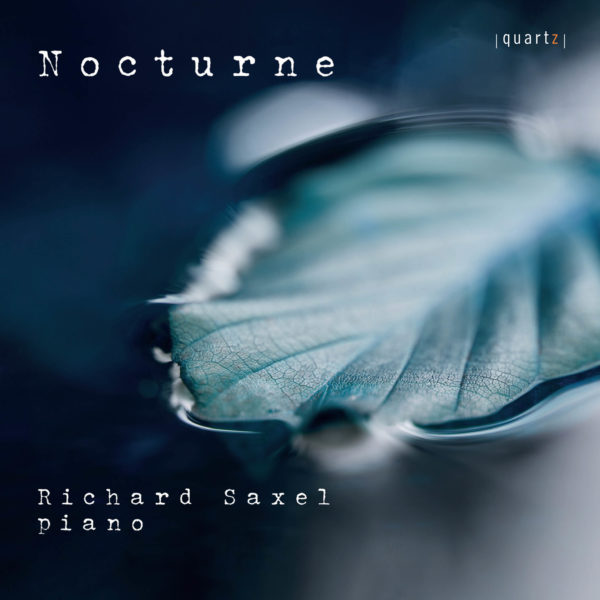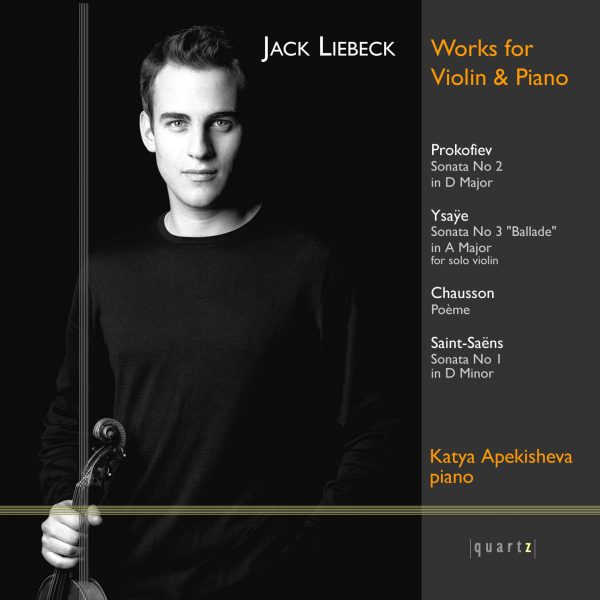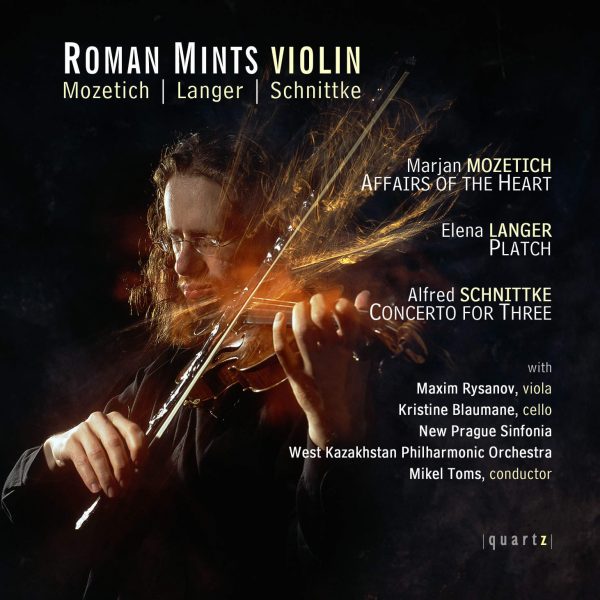The Leaden Echo
Price range: £5.99 through £11.99
Return
for oboe, clarinet, two violins, viola, cello and tape
Du coté de chez Swan
for two pianos
Variations on the Obtaining of a Dwelling
for cello and piano
Wie der Alte Leiermann…
for violin and piano
The Leaden Echo
for voice(s) and instruments
to the words of Gerard Manley Hopkins
Main Theme from motion picture Moscow Nights
arranged for violin and string ensemble by Roman Mints
Leonid Desyatnikov is one of the most successful living Russian composers. The release of The Leaden Echo with words by Gerard Manley Hopkins is one of the disc’s six works which the composer considers to be amongst the most important of his output.
Roman Mints has brought together some of the finest Russian musicians recording today, including Maxim Rysanov, Kristine Blaumane, Boris Andrianov, Dmitri Bulgakov, Jacob Katsnelson, Petr Kondrashin, Fedor Lednev and the British counter tenor William Purefoy
About This Recording
Leonid Desyatnikov: Between “Then” and “Now”
The art of Leonid Desyatnikov has defined the landscape of Russian academic music over the past two decades to the same degree that Dmitri Shostakovich’s music represents the musical culture of the mature Soviet Union and Alfred Schnittke’s music, the pre-perestroika period. Historically speaking, Desyatnikov’s work is a reaction to the music of late-Soviet mainstream composers, which was suffused with a wordless but easily grasped dissidence, in the same way that each premiere by Sofia Gubaidulina, Edison Denisov or Schnittke was regarded primarily as a manifestation of resistance. With the collapse of the Soviet Union, interest in the music of these composers has returned to a calm, more appropriately academic vein. It was always like this: Soviet music, whether by Shostakovich or Schnittke, was meant to be something more than simply music. Desyatnikov, who reached creative maturity at the watershed of two social and cultural periods, opposed this tradition already in his early compositions. His music has eschewed taking too much on itself because it knows its own real worth. “I believe,” says Desyatnikov, “that the composer, if he has survived in modern times, must aspire first and foremost to perfection rather than self-expression. By perfection, I have in mind only beauty and harmony of proportions.” Desyatnikov has contrasted the Soviet avant-garde, which was mainly engaged in shaking social and cultural foundations, with the “repairing of old ships” bequeathed by his idol and role model Igor Stravinsky. Desyatnikov greeted the resetting of historical memory in Russia (that ensued right after the perestroika period) by engaging in an active dialogue with landmark texts of the European musical past.
Variations on the Obtaining of a Dwelling for cello and piano (1990), Du coté de chez Swan, for two pianos (1995), and Wie der alte Leiermann, for violin and piano (1997) form a triptych that it would be most apt to characterise by quoting a description of the methods employed by a renowned albeit fictitious writer, the hero of Russian émigré author Vladimir Nabokov’s first English-language novel, The Real Life of Sebastian Knight (1941): “It is as if a painter said: look, here I’m going to show you not the painting of a landscape but the painting of different ways of painting a certain landscape and I trust their harmonious fusion will disclose the landscape as I intend you to see it.” Desyatnikov exposes to public view the privacy of his own life as a composer by thematising in each of his own pieces his work with borrowed musical material, whose customary internal linkages are set in motion in order to form fundamentally new structures. Desyatnikov contrasts the image of the artist as demiurge with its polar opposite. As he notes with ironic modesty, “I’m not a thinker or a prophet. For me, the figure of the artisan is higher in the social hierarchy than the figure of the thinker. And that is what I try to be, an artisan.” Variations on the Obtaining of a Dwelling is based on the finale of Joseph Haydn’s “Farewell” Symphony (Symphony No. 45 in F-sharp minor). The piece’s motley acoustic matter is held together by a common quality – consonance: Desyatnikov uses this musical tool to convey the theme of acquiring ground under one’s feet. The theme is presented as an unhurried improvisation: the musician has at last found a haven where he can peacefully do his work. It becomes obvious after the first elaboration of the theme that there are two characters in this musical narrative: the cello’s prelude is each time echoed by the piano’s response, which rounds out the passage. Variations on the Obtaining of a Dwelling are variations on style: Haydn’s theme is now rendered in an Indian manner (the pizzicatos performed by the cello are simultaneously reminiscent of tablas and the sitar), now, in the emotional culmination, it takes on frankly Mahleresque overtones. The starting and ending point for these stylistic metamorphoses is the Russian melos that frames the Variations: the composition opens with the cello imitating a folk tune as played on a plucked folk instrument, while the closing bars of the piano part are notated quasi armonica. The programmatic meaning of this gesture is fairly simple: the composer now has a place whence he can go out into the world and a place to come home.
Du coté de chez Swan (rather than “Swann”: Desyatnikov’s preference for titles with complex aftertastes – e.g., Liebe und Leben des Dichters, The Rite of Winter 1949, from The Russian Seasons – is something fundamental to his work) is based on the theme The Swan (Le cygne) by Camille Saint-Saens, which acquired cult-like fame thanks to the solo dance performed by ballerina Anna Pavlova. Spurred on by syncopation, the majestic, noble theme rises from the bass keys of the piano (as if from the foam of the sea) to the sound of a warning bell: Desyatnikov signals here the irreplaceability of the harmony and beauty left in the past, which are recalled only by the G-major shards borrowed from the piece’s prototype. Employing the same building blocks (scales and arpeggios) as in The Swan, Desyatnikov erodes his source’s intonation with intricate “nervous” notes and rhythms. (He indicates that the piece contains “traces of a fascination with Ligeti, in particular his Three Pieces for Two Pianos.”) This closed minimalistic loop leads nowhere: beauty remains lost in the past and in the piece’s coda the swan flies away, its wings casting a shadow on the final pages of the score.
In the final part of the triptych, Wie der alte Leiermann, which was commissioned by Gidon Kremer for the Schubert Today project, Desyatnikov takes the most radical approach to his borrowed musical material. He defines the genre of the piece as follows: “Not variations, not a fantasia, not a paraphrase. This is a commentary.” In commenting this “nineteenth-century minimalist masterpiece,” the final lieder from Winterreise, Desyatnikov follows the tactic employed by Schubert in composing variations on the themes of his own songs. Here the composer “not only departs greatly from the meaning and mood of the poems set to music, but also neglects the traditional song form, which is no more than an initial impulse.” Written for one of today’s pre-eminent violinists, the work is in some sense a musical portrait of him: in Wie der alte Leiermann, one can detect certain allusions to Kremer’s exclusive repertoire. Desyatnikov gives sophisticated listeners the right to “guess this charade” on their own.
Dedicated to Petersburg art scholar Arkady Ippolitov, The Leaden Echo, for voice(s) and instruments, after the eponymous poem by Gerard Manley Hopkins (1991), is organically linked to Desyatnikov’s triptych from the 1990s. The composition’s underlying stylistic code – the English Baroque (“The Dark Is My Delight,” Purcellian spleen, the viscous violas, the fallen angel voice of the countertenor, etc.) is reflected in Pre-Raphaelite aestheticism with its cult of beauty. A maxim by Pre-Raphaelite ideologue Walter Pater might have served as the piece’s epigraph: “For art comes to you proposing frankly to give nothing but the highest quality to your moments as they pass, and simply for those moments” sake. How to kéep beauty, from vanishing away? / is there no frowning of these wrinkles, rankéd wrinkles deep, / Dówn? O there is none; no no no there’s none: / Be beginning to despair, to despair. This vanishing is the subject of The Leaden Echo, a titanic lamentation (almost like that of another fictitious artist, the composer Adrian Leverkehn in Thomas Mann’s monumental novel Doctor Faustus), an elegy on the impossibility of halting the corrosive, destructive flow of time. (A year earlier, in the finale of the vocal cycle Liebe und Leben des Dichters, Desyatnikov had used other words to address the same subject.)
The theme of extending bridges between “then” and “now,” which is central to Desyatnikov’s work, is especially vividly incarnated in one of his latest pieces, Return, for six instruments (2006), which was commissioned by the Homecoming Chamber Music Festival in Moscow. The form of the piece is even more hermetic than is usually the case in Desyatnikov’s work, consisting of a series of strict ostinatos. The changes wrought within the first variation, which is lapidary and elegant, are homeopathic (with their allusions to plangent Russian folksongs and the “conventionally romantic”): nothing as it were happens in the music. The story of Return to be found in the relentless progress towards the final statement of the theme, which is heard in a recording of gagaku music (ancient Japanese ceremonial music). The work’s plot is simple: European instruments expound one and the same musical sequence in the tempered scale and then at the end we hear its untempered source. The notes are seemingly the same, but the resulting “music” is quite different. Like all of Desyatnikov’s music, Return is about the tragic impossibility of uniting ages, traditions, and cultures into an integral worldview.
Dmitry Renanskytranslated by Thomas Campbell
Track Listing
-
Leonid Desyatnikov
- Return
- Du coté de chez Swan
- Variations on the Obtaining of a Dwelling
- Wie de Alte Leiermann
- The Leaden Echo
- Main Theme from motion picture: Moscow Nights
